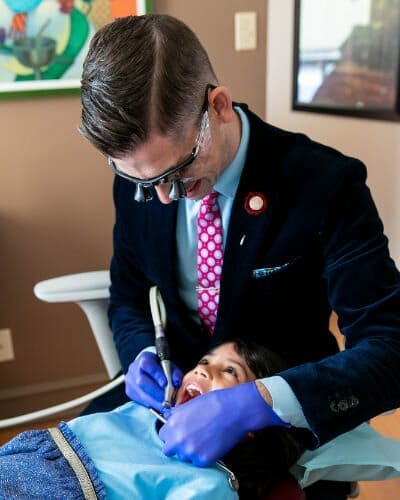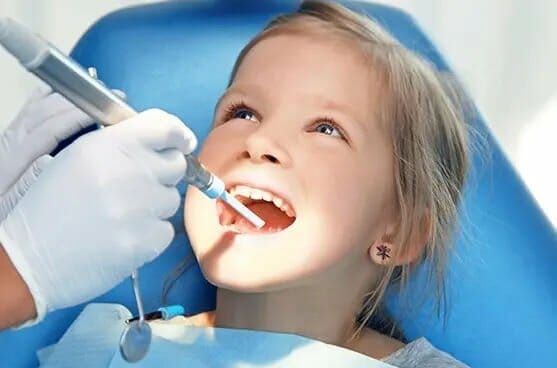Dr. Hornby has 3 young children of his own and can understand why it might be anxiety-provoking for a child to visit a new place like the dental office. The 1st visit is an important building block in the formation of a positive relationship between your child and their Dentist. Dr. Hornby is honored to have you entrust him with your child’s dental care. The team at Enamel Republic will strive to make your little one’s first visit positive and stress-free.

The first visit is as much about helping parents establish good oral hygiene for their children as it is about the children themselves. It is important that this visit be a positive one for your child, as this will set the tone for future visits to be positive as well.
Your own level of anxiety can be a strong indication of how your child will behave at the dentist. If you are nervous, it’s likely your child will feel the same. By putting your child in the proper frame of mind, you can help make their first visit a positive and enjoyable experience.
Here are some tips for helping that first visit go smoothly:
Remember: Young children are often fearful of the unknown or of being separated from a parent. Others are just shy. We treat many children in our office and know numerous ways to help anxious or fearful children cope during their visit.
Your child’s first visit to Enamel Republic will be a brief one aimed at introducing them to our dental team and the clinic in a friendly, non-threatening manner.

Your child must be accompanied by a parent or legal guardian on their first visit, as there are medical and dental health forms to be completed. Be sure to bring along a list of any medications your child takes, and be prepared to discuss any health or behavioral concerns. This type of information is important in helping us to treat your child in an effective and safe manner.
During this visit, we will:
Typically, your child’s teeth will not be cleaned during their first visit, as we want to make the experience as fun and easy as possible. However, if your child is three years of age or older at the time of their first visit, we may recommend a cleaning and fluoride application to remove plaque and tartar from teeth and reinforce the importance of proper home care.
Not only do primary teeth play a key role in helping your child to chew food and speak clearly, they also lay the foundation for underlying permanent adult teeth to be healthy and properly aligned. For this reason, it is just as important to care for baby teeth now as it is to care for the adult teeth that grow in later on.
To limit the potential for adverse affects on the health and development of adult teeth, it is important that cavities in baby teeth be treated before the tooth breaks down, becomes infected or requires early removal. It is possible for an untreated infection or abscess associated with a baby tooth to damage the corresponding permanent tooth underneath it. Cavities in baby teeth can also create a lot of pain, affecting not only your child’s general well-being, but also their sleep patterns, eating habits, and ability to concentrate at school.
Tooth decay has many different appearances, so it’s important to take a careful look at your child’s teeth when you brush them. Large decay often appears as a hole, or cavity, while smaller decay usually appears as a stain that is yellow, brown or chalky white in color. Decay can happen virtually anywhere on a tooth. One of the most common sites is between the teeth. Because we are unable to view this area of the tooth, it is important that X-rays be taken so we can assess the whole situation. If you see something on your child’s teeth that you suspect might be decay, be sure to let us know as soon as possible.
Because all children react differently, at Enamel Republic, we are well-versed in a variety of methods designed to help your child’s experience be a good one. We take into account your child’s age and health status, the procedures required and any past experiences your child may have had.
The most common technique we employ is called “Tell-Show-Do.” We begin by explaining to your child the work that is going to be done. We then demonstrate the procedure to your child using our instruments before finally performing the procedure in your child’s mouth. Desirable behavior is continually rewarded through compliments and praise.
During your child’s future appointments, we encourage you to remain in our reception area. Doing so will help build your child’s trust and confidence in our team and help to enhance our communication with your child. Our team are experts in handling all types of young patients in a friendly, understanding and respectful manner.

OFFICE HOURS